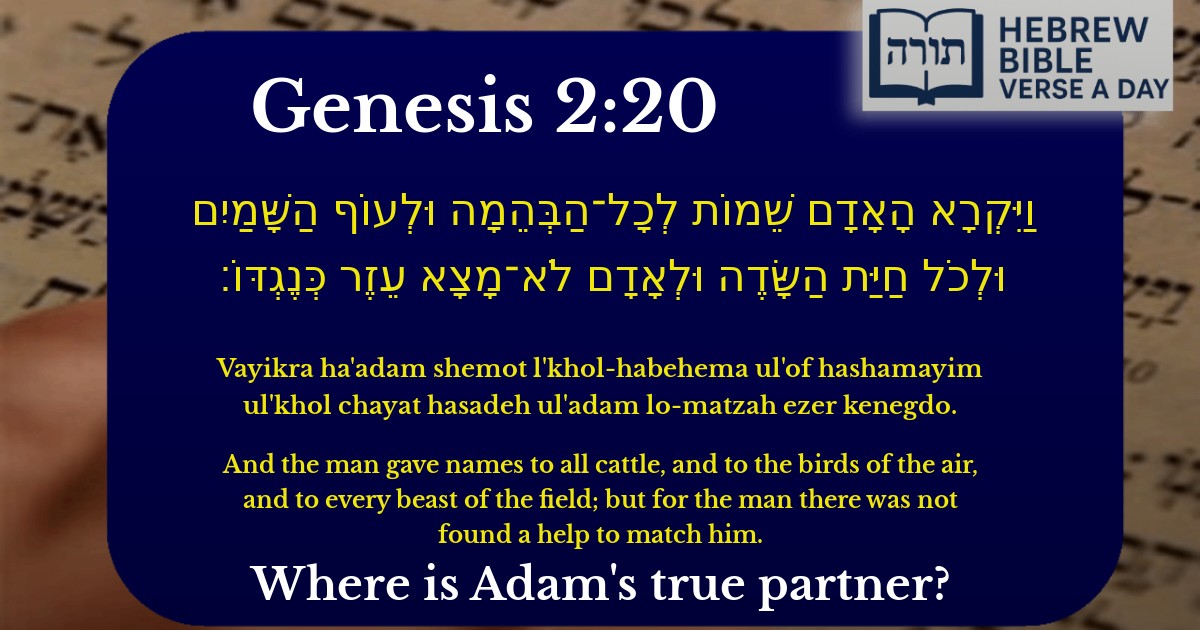Frequently Asked Questions
Q: What does it mean that Adam named all the animals?
A: According to Rashi, Adam's ability to name the animals demonstrated his superior wisdom, as he gave each creature a name that reflected its true nature. This showed that he was uniquely qualified to be the caretaker of creation (Rashi on Genesis 2:20).
Q: Why couldn't Adam find a 'help to match him' among the animals?
A: The Midrash explains that while animals could provide companionship, none were truly equal to Adam in intellect or purpose. Only another human—Chava (Eve)—could be his proper partner, sharing his divine image and spiritual potential (Bereshit Rabbah 17:4).
Q: What lesson can we learn from Adam naming the animals?
A: The Rambam teaches that this episode highlights humanity's role as stewards of creation. By understanding each creature's essence (as shown through naming), we learn to respect all living things while recognizing our unique responsibility to elevate the world through Torah and mitzvot (Guide for the Perplexed 1:2).
Q: How does this verse relate to marriage in Judaism?
A: The Talmud derives from 'a help to match him' that an ideal marriage unites two partners who complement each other's spiritual growth. Just as Adam needed Chava to fulfill his purpose, spouses help each other serve Hashem completely (Yevamot 63a, based on Genesis 2:20).
Q: Why is naming important in the Torah?
A: As seen with Adam, naming in Torah represents understanding something's fundamental truth. The Maharal explains that Hebrew names reveal the spiritual essence of what they describe—which is why Adam's divinely inspired names for animals remain significant (Gur Aryeh on Genesis 2:20).


The Significance of Naming the Animals
Rashi (Bereshit 2:20) explains that Adam's ability to name the animals demonstrated his superior wisdom, as each name reflected the essence of the creature. This act of naming was not arbitrary but revealed Adam's deep understanding of each animal's nature, as granted by Hashem. The Midrash (Bereshit Rabbah 17:4) elaborates that Adam's wisdom was so profound that even the angels acknowledged his insight.
The Search for a "Help to Match Him"
The phrase "עֵזֶר כְּנֶגְדּוֹ" ("a help to match him") is interpreted in multiple ways by our sages:
The Loneliness of Adam Before Chava
The verse emphasizes that "לְאָדָם לֹא־מָצָא עֵזֶר כְּנֶגְדּוֹ"—no suitable helper was found among the animals. The Midrash Tanchuma (Bereshit 6) states that Adam attempted to cohabit with the animals but found no satisfaction, highlighting that human companionship is unique and irreplaceable. This teaches that marriage is not merely for procreation but for emotional and spiritual partnership.
The Deeper Lesson in Human Relationships
The Maharal (Gur Aryeh) explains that this verse sets the foundation for the sanctity of marriage. Unlike animals, humans require a bond that transcends physicality—a union of souls. The absence of a suitable helper led to the creation of Chava, illustrating that true companionship is a divine gift, essential for human fulfillment.